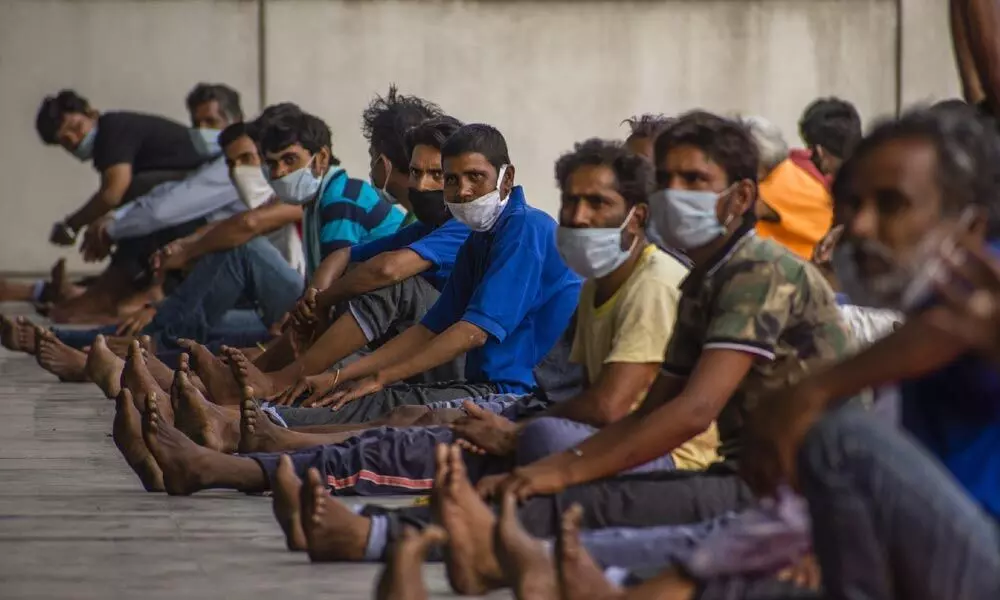Path to economic recovery in Telangana State: Points to ponder
 For representational purpose
For representational purposePeople with some knowledge of local history know that people of Hyderabad in the past have successfully encountered deadly epidemics. In fact, Hyderabad city was shaped and reshaped by epidemics.
People with some knowledge of local history know that people of Hyderabad in the past have successfully encountered deadly epidemics. In fact, Hyderabad city was shaped and reshaped by epidemics. First recorded epidemic was in 1591 when people from Golconda area were shifted to an area outside the then city limits. Plague and Cholera epidemics played havoc with the lives of common people.
During the Spanish Influenza (1916-1918), the present day Government Fever Hospital at Koranti (a corrupt word for quarantine) was used to quarantine the people affected by the epidemic. During those days, the strategy to fight the epidemic was to vacate the house and stay in temporary shelters. Sometimes, religious places like temples and dargahs served as temporary shelters. It is interesting to note that presently the people of Komatpalli village in Lingampet mandal of Kamareddy district in Telangana State have adopted such a strategy. They have literally locked their houses and are staying in temporarily erected shelters in their fields. In the present day context, moving the people of a large- sized city is unthinkable. We have to evolve a different strategy to fight against COVID-19.
We can be successful in a war only when we correctly assess the strength of our enemy. Due to long incubation period, it becomes difficult to identify persons affected by Covid-19 from symptoms. At the same time, it is costly and time consuming to test all the people. Therefore, it is essential to survey all the people living in hot spots. This requires a large number of Rapid Test Kits and a different strategy to fight against Covid-19. Time and again the government of Telangana has expressed its commitment (with the cooperation of the people) to fight against Covid-19. Already it has taken a few measures. Under the changed scenario, a new Action Plan has to be evolved. It would be worthwhile to consider the aspects highlighted hereunder.
♦ There is an urgent need to import sufficient number of Rapid Test Kits to detect the persons affected by Covid-19 by conducting complete census survey in the hot spots.
♦ Conduct census survey of all people (irrespective of symptoms or not). Further, a strict watch must be there even on those people who are discharged from isolation ward.
♦ Provide makeshift shelters on government land to migrant workers whose existing accommodation is to congested and unhygienic. Some skills may be imparted to them which will enable them to earn some income.
♦ Explore the possibility of providing assistance to the ration card holders in kind (a bag containing all the essential items as adopted Kerala) instead of present policy of providing food grains and some cash.
♦ To keep strict vigil on the delivery mechanism from wholesalers to retailers to prevent undue increase in the price of essential items in the market.
♦ At all costs social distancing must be ensured at public places.
♦ It is a matter of great relief that in rural areas, the speed of transmission of Covid-19 is very slow. However, the general lockdown will put them to unnecessary hardship for no fault of theirs. Due to lockdown, on one hand cultivation activities have come to a standstill at a crucial time i.e., harvesting of rabi crops and on the other hand, due to the suspension of works under Mahatma Gandhi National Rural Employees Guarantee Scheme (MGNREGS), the labours have no work and hence no income. To overcome this unfortunate situation, MGNREGS works have to be coordinated with the cultivation activities. In this regard, several field-based research studies have made useful policy recommendations. For unknown reasons, all these recommendations fell on deaf ears of policy-makers. It is very heartening to hear from K Chandrashekar Rao, Chief Minister of Telangana State, putting forward a proposal to utilise MGNREGS fund to meet (at least partially) the labour cost incurred by the cultivators. Field-level studies reveal that due to the implementation of MGNREGS, the wage rate in the rural areas has increased and the cultivators are experiencing labour shortage and that the cultivation has become unprofitable. Therefore, the cultivators demand that the MGNREGS works be suspended during the period of peak cultivation activities. They expressed their willingness to pay original wages to the labour for working in their field and the government can pay additional component (hiked component). This proposal is worth considering as it is both cultivator-friendly and labour-friendly. Further, it will reduce the burden on the government exchequer. In this regard, there is a general consensus among the researchers working in this area. However, some cast doubt on its implementation and fear that only large farmers will corner the benefits of such provision. To overcome such problems, the benefits of such provision may be confined only to the marginalised and small farmers.
♦ To make things easier for the farmers, the procurement should be made at village level and food grains so procured may be stored temporarily in vacant village school buildings.
♦ For the benefit of owners of dairy farm and poultry farms, the supply of the required fodder and feed must be made by entrusting the work to the private truck and mini-van operators, who are presently almost idle. This will help both the parties. Arrangements need to be made to supply the required inputs to the rural artisans and transport their finished products to the wholesale dealers. This will overcome many problems faced by the artisans.
♦ Self Help Group members must be entrusted with the work of making mask to cover the face. This move will not only strengthen the general public in the fight against Covid-19 but also enhance the income of the SHG members. An Action Plan with these elements will ensure success in the fight against Covid-19.
(S Indrakant is Visiting Professor, CESS, Hyderabad and N Lingamurthy is former Vice-Chancellor, Kakatiya University, Warangal. Views expressed are personal)








